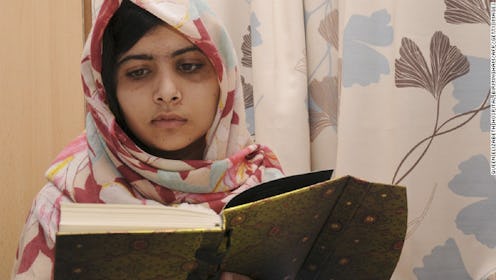News
Malala's Bittersweet Anniversary

A year ago this week, Malala Yousafzai was on her way home from school in the Swat Valley of Pakistan. But the now-infamous Malala Yousafzai also had another name: Gul Makai. It was in part because of this second name that a man boarded the bus, located her among the other students, and in the name of the Taliban, shot her in the head.
She survived. And she spoke.
What's in a name? For Yousafzai, everything. Gul Makai was the pen name she blogged under between January and March 2009 for the BBC Urdu service when the Taliban took control of her hometown in northwestern Pakistan and barred girls from schools. Yousafzai was already known for her activism: In September 2008, she'd given a speech at a local press club titled, "How Dare the Taliban Take Away My Basic Right to Education?"
"You may stop me from going to school, but you will not stop me from learning,” she admonished the Taliban in her speech.
At the time, Yousafzai was 11. Her picture and words appeared across Pakistani media. People knew who Yousafzai was.
Despite the dangers of blogging — posts she dictated over the phone to journalists at the Bureau — and despite the ban, she kept going to school anyway.
And so when the gunman boarded her bus and demanded, "Who is Malala?" maybe he had an idea of who to look for. Her friend pointed at her. Yousafzai tried to deny her identity, but he shot her anyway.
One year and one miraculous recovery later, Yousafzai has become an international symbol and activist fighting for the right of all children to an education. In an interview with Diane Sawyer that airs tonight at 10 on ABC, Yousafzai shares with U.S. audiences her story and her mission as a "a campaigner of education ... a children's rights activist and ... a women's rights activist."
"I think life is always dangerous," Malala says to Sawyer. "Some people get afraid of it. Some people don't go forward. But some people, if they want to achieve their goal, they have to go ... And now I know that you must not be afraid of death. And you must move forward. You must go forward, because education and peace is very important."
After an evacuation for further treatment for her wounds in Birmingham, Yousafzai began another fight: to take her crusade, begun in the first sentence of that BBC blog, to a global stage.
For her 16th birthday in July, she addressed the UN about the importance of free, compulsory education for women. Along the way, she's become a rumored favorite for the Nobel Peace Prize, signed a $3 million book deal for I Am Malala, and been named one of Time's Time 100, the magazine's shortlist of the most influential people of the year.
But it's not just America that will be listening. The Taliban is still waiting. They know Yousafzai survived, and they've sworn to kill her.
"We know that terrorists are afraid of the power of education," Yousafzai said.
But she still bears a message of peace.
"The best way to solve problems and to fight against war is through dialogue," she said. "[The Taliban is] misusing the name of Islam ... I hope that a day will come [when] the people of Pakistan will be free, they will have their rights, there will be peace and every girl and every boy will be going to school."